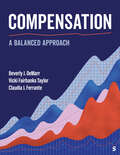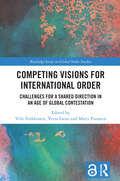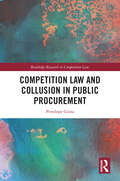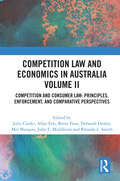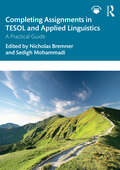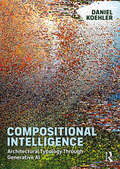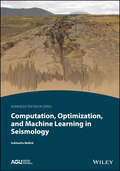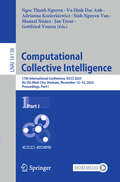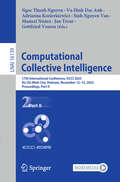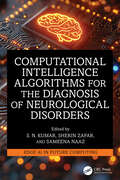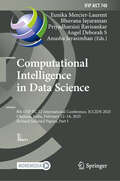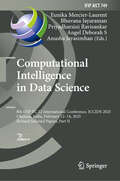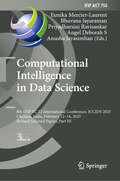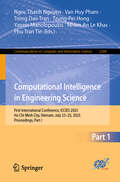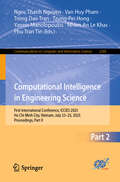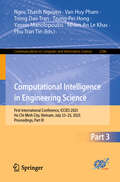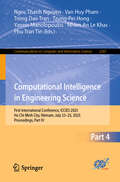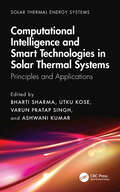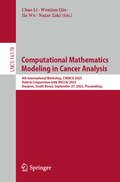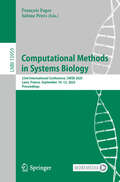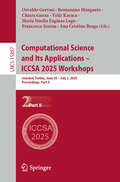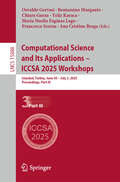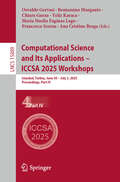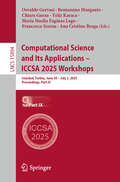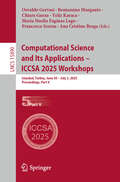- Table View
- List View
Compensation: A Balanced Approach
by Beverly J. DeMarr Vicki Taylor Claudia J. FerranteCompensation: A Balanced Approach 1e takes an applied approach to covering compensation systems and practices by balancing theory and research with exercises and applications. Each chapter looks at compensation from both the employer and employee perspective, giving students a more holistic understanding of the role total rewards play in an organization. Authors Beverly J. DeMarr, Vicki Fairbanks Taylor, and Claudia J. Ferrante help students develop the ability to think critically and ethically about compensation decisions and their effects on both employers and employees.
Competing Visions for International Order: Challenges for a Shared Direction in an Age of Global Contestation (Routledge Series on Global Order Studies)
by Ville Sinkkonen Veera Laine Matti PuranenThis book explores the international ordering visions of key global and regional powers in the international system from 2014 onwards.Using a fourfold analytical framework based on the distributional, normative, institutional, and temporal dimensions of the visions propagated by the relevant political elites in the states/actors in question, the book addresses the ultimate question in international relations for the coming decades: To what extent can the visions pushed forward by the leading powers of the world be reconciled to arrive at a shared direction for international order writ large? The book’s analysis also offers normative prescriptions on how to avoid a tragic race to the bottom – a fragmented world of competing orders where states are unable to address shared global crises and challenges such as pandemics, cross-border crime, climate tragedies, and armed conflict. With this, it concludes by recognising the importance of agency as well as political imagination in navigating the crisis-ridden ordering moment of the international system.This book will be of key interest to scholars and students in global order studies and governance, geopolitics, regional studies, foreign policy analysis as well as more broadly to international relations and security, political history, human geography, and policymakers.
Competition Law and Collusion in Public Procurement (Routledge Research in Competition Law)
by Penelope GiosaThis book examines infringements of competition law in public procurement settings, evaluating the latest European Procurement Directive 2014/24/EU to examine to what extent its provisions facilitate or deter collusion during specific award procedures.Public contracts account for a significant proportion of EU expenditure. In sectors such as energy, transport, social protection and the provision of health or education services, public authorities are the main purchasers. It is important to ensure that public contracts are awarded in an open, fair and transparent manner that enables domestic and non-domestic firms to compete on an equal basis, with the aim of improving the quality and lowering the price of purchases made by public authorities. This book assesses the competition law enforcement mechanisms that competition regulators bring to the area of public procurement in the attempt to deter bid rigging. It analyzes key tools for the public and private enforcement of competition law in the domain of public contracts, such as the leniency programme, damages claims for bid rigging and the whistle blower programme. The book uses auction theory as benchmark to assess the risk of collusion in the context of procurement procedures and techniques. Offering a holistic analysis informed by research, it makes recommendations for better design, set up and management of public tenders without distorting competition. Highlighting the need to make use of competition law enforcement mechanisms in the battle against collusion in public procurement, it identifies ways in which the procurement process can be improved, to reduce and prevent bid rigging.The book will be of interest to researchers in the field of competition law, public procurement and EU law.
Competition Law and Economics in Australia, Volume II: Competition and Consumer Law: Principles, Enforcement, and Comparative Perspectives
by Brent Fisse Mel Marquis Deborah Healey Julie Clarke Rhonda L. Smith Allan Fels John E. MiddletonMarking the 50th anniversary of modern statutory competition law in Australia, this two-volume set brings together more than 40 leading experts to discuss the most important issues and developments arising under Australian competition law, economics, and policy.This publication discusses current reforms and reviews the impact of competition law and consumer law in the Australian economy over the last 50 years, since the enactment of the Trade Practices Act 1974. Contributors examine the legacy of this landmark legislation, important precedents and cases that have shaped contemporary Australian competition law, as well as the substantive, procedural, and institutional features in need of revision. Volume I focuses on the history and context of Australian competition law, the courts and tribunal, and the competition system established by the Competition and Consumer Act. Volume II discusses key issues relating to consumer protection law, the digital economy, enforcement, remedies, and sanctions. It also considers the Australian competition regime from a comparative perspective. This volume, alongside its companion, The Competition Law System: Context, Law and Economics, is an authoritative treatise that will interest the broader competition law and policy community around the world. Together, they provide essential insights for academics, researchers, practitioners, consumer associations, policymakers, and regulators.
Completing Assignments in TESOL and Applied Linguistics: A Practical Guide
by Nicholas Bremner Sedigh MohammadiCompleting Assignments in TESOL and Applied Linguistics: A Practical Guide is an invaluable companion for anyone dealing with assignments in these fields.This hands-on guide walks students through every stage of assignment preparation, from unpacking assignment briefs and engaging in critical reading, to synthesising sources and developing academic writing. With clear, step-by-step guidance, each chapter addresses key skills while offering targeted support for specific assignment types, including: Critiquing a journal article, course, test or digital application Language analysis assignments Designing and justifying a lesson plan Reflective assignments Academic presentations Research proposals Contributions from educators and previous students worldwide provide balanced perspectives on tackling tasks that are enriched with real examples, feedback and reflective commentaries, as well as frequently asked questions. Designed to build confidence and competence, this accessible guide is essential for students aiming to succeed in TESOL, applied linguistics and related fields.
Compositional Intelligence: Architectural Typology through Generative AI
by Daniel Koehler*With a foreword by Mario Carpo*Given the extensive data sources represented by urban environments, this book investigates the potential of architecting for cities using large-scale models – the technological underpinning of Generative AI. Koehler examines Large Language Models (LLMs) in relation to architectural questions of typology – those critical junctures where architecture engages with the city itself. Typology becomes the interface between an AI model and its modeled audiences, represented languages, and scales of operation.The investigation reveals how LLMs represent a fundamental shift from comprehending discrete elements to understanding entire languages – introducing a stochastic perspective that transforms how we read and shape urban reality. At the heart of this framework lies the concept of “inductive types” – threshold interfaces that superpose multiple value regimes and actively reconfigure themselves in response to changing urban conditions. By treating architecture as a form of representational materialism rather than a fixed language, designers can engage with complex urban systems while maintaining critical agency.This approach envisions architecture as an embedding of languages, where buildings become processors of information that compute through their spatial arrangements. The synthetic knowledge produced by LLMs enables access to plural values and stakeholder perspectives, allowing architects to participate in broader material ecologies through computational superposition rather than traditional dialectical methods.Providing a robust theoretical framework as well as practical insights into how architects can adapt their notational tools and design processes to embrace AI, this will be an essential read for any practicing or researching architect or urban designer interested in the implications of AI on the built environment.
Computation, Optimization, and Machine Learning in Seismology (AGU Advanced Textbooks)
by Subhashis MallickA textbook applying fundamental seismology theories to the latest computational tools The goal of computational seismology is to digitally simulate seismic waves, create subsurface models, and match these models with observations to identify subsurface rock properties. With recent advances in computing technology, including machine learning, it is now possible to automate matching procedures and use waveform inversion or optimization to create large-scale models. Computation, Optimization, and Machine Learning in Seismology provides students with a detailed understanding of seismic wave theory, optimization theory, and how to use machine learning to interpret seismic data. Volume highlights include: Mathematical foundations and key equations for computational seismology Essential theories, including wave propagation and elastic wave theory Processing, mapping, and interpretation of prestack data Model-based optimization and artificial intelligence methods Applications for earthquakes, exploration seismology, depth imaging, and multi-objective geophysics problems Exercises applying the main concepts of each chapter
Computational Collective Intelligence: 17th International Conference, ICCCI 2025, Ho Chi Minh City, Vietnam, November 12–15, 2025, Proceedings, Part I (Lecture Notes in Computer Science #16138)
by Ngoc Thanh Nguyen Gottfried Vossen Manuel Núñez Jan Treur Adrianna Kozierkiewicz Vu Dinh Duc Anh Sinh Nguyen VanThis two-set volume LNAI 16138-16139 constitutes the refereed proceedings of the 17th International Conference on Computational Collective Intelligence, ICCCI 2025, held in Ho Chi Minh City, Vietnam, during November 12–15, 2025. The 67 revised full papers presented in these proceedings were carefully reviewed and selected from 290 submissions. The papers are organized in the following topical sections: Part I: Collective Intelligence and Collective Decision-Making; Co-operative Strategies for Decision-Making & Optimisation; Natural Language Processing; Knowledge Engineering & Industry 4.0 Applications; Data Mining & Machine Learning. Part II: Social Networks and Intelligent Systems; Cyber-Security, Blockchain & IoT; Computational Intelligence in Medical Applications; Computational Intelligence for Digital Content Understanding.
Computational Collective Intelligence: 17th International Conference, ICCCI 2025, Ho Chi Minh City, Vietnam, November 12–15, 2025, Proceedings, Part II (Lecture Notes in Computer Science #16139)
by Ngoc Thanh Nguyen Gottfried Vossen Manuel Núñez Jan Treur Adrianna Kozierkiewicz Vu Dinh Duc Anh Sinh Nguyen VanThis two-set volume LNAI 16138-16139 constitutes the refereed proceedings of the 17th International Conference on Computational Collective Intelligence, ICCCI 2025, held in Ho Chi Minh City, Vietnam, during November 12–15, 2025. The 67 revised full papers presented in these proceedings were carefully reviewed and selected from 290 submissions. The papers are organized in the following topical sections: Part I: Collective Intelligence and Collective Decision-Making; Co-operative Strategies for Decision-Making & Optimisation; Natural Language Processing; Knowledge Engineering & Industry 4.0 Applications; Data Mining & Machine Learning. Part II: Social Networks and Intelligent Systems; Cyber-Security, Blockchain & IoT; Computational Intelligence in Medical Applications; Computational Intelligence for Digital Content Understanding.
Computational Intelligence Algorithms for the Diagnosis of Neurological Disorders (Edge AI in Future Computing)
by Sherin Zafar S. N. Kumar Sameena NaazThis book delves into the transformative potential of artificial intelligence (AI) and machine learning (ML) as game-changers in diagnosing and managing neurodisorder conditions. It covers a wide array of methodologies, algorithms, and applications in depth.Computational Intelligence Algorithms for the Diagnosis of Neurological Disorders equips readers with a comprehensive understanding of how computational intelligence empowers healthcare professionals in the fight against neurodisorders. Through practical examples and clear explanations, it explores the diverse applications of these technologies, showcasing their ability to analyze complex medical data, identify subtle patterns, and contribute to the development of more accurate and efficient diagnostic tools. The authors delve into the exciting possibilities of AI-powered algorithms, exploring their ability to analyze various data sources like neuroimaging scans, genetic information, and cognitive assessments. They also examine the realm of ML for pattern recognition, enabling the identification of early disease markers and facilitating timely intervention. Finally, the authors also address the critical challenges of data privacy and security, emphasizing the need for robust ethical frameworks to safeguard sensitive patient information.This book aims to spark a conversation and foster collaboration among researchers, clinicians, and technologists, and will assist radiologists and neurologists in making precise diagnoses with enhanced accuracy.
Computational Intelligence in Data Science: 8th IFIP TC 12 International Conference, ICCIDS 2025, Chennai, India, February 12–14, 2025, Revised Selected Papers, Part I (IFIP Advances in Information and Communication Technology #748)
by Eunika Mercier-Laurent Bhuvana Jayaraman Priyadharsini Ravisankar Angel Deborah S. Anusha JayasimhanThe three-volume set IFIP ICCIDS 748, 749 and 750 constitutes the refereed post-conference proceedings of the 8th IFIP TC 12 International Conference on Computational Intelligence in Data Science, ICCIDS 2025, held in Chennai, India, during February 12–14, 2025. The 91 papers including 70 regular papers and 21 short papers included in these proceedings were carefully reviewed and selected from 317 submissions. The papers are organized in the following topical sections: Part I: Computer Vision for Real World Applications. Part II: Computer Vision for Real World Applications; Emerging Trends in AI for Speech and Text. Part III: Emerging Trends in AI for Speech and Text; Computational Intelligence for Secure, Smart and Sustainable Applications
Computational Intelligence in Data Science: 8th IFIP TC 12 International Conference, ICCIDS 2025, Chennai, India, February 12–14, 2025, Revised Selected Papers, Part II (IFIP Advances in Information and Communication Technology #749)
by Eunika Mercier-Laurent Bhuvana Jayaraman Priyadharsini Ravisankar Angel Deborah S. Anusha JayasimhanThe three-volume set IFIP ICCIDS 748, 749 and 750 constitutes the refereed post-conference proceedings of the 8th IFIP TC 12 International Conference on Computational Intelligence in Data Science, ICCIDS 2025, held in Chennai, India, during February 12–14, 2025. The 91 papers including 70 regular papers and 21 short papers included in these proceedings were carefully reviewed and selected from 317 submissions. The papers are organized in the following topical sections: Part I: Computer Vision for Real World Applications.Part II: Computer Vision for Real World Applications; Emerging Trends in AI for Speech and Text.Part III: Emerging Trends in AI for Speech and Text; Computational Intelligence for Secure, Smart and Sustainable Applications
Computational Intelligence in Data Science: 8th IFIP TC 12 International Conference, ICCIDS 2025, Chennai, India, February 12–14, 2025, Revised Selected Papers, Part III (IFIP Advances in Information and Communication Technology #750)
by Eunika Mercier-Laurent Bhuvana Jayaraman Priyadharsini Ravisankar Angel Deborah S. Anusha JayasimhanThe three-volume set IFIP ICCIDS 748, 749 and 750 constitutes the refereed post-conference proceedings of the 8th IFIP TC 12 International Conference on Computational Intelligence in Data Science, ICCIDS 2025, held in Chennai, India, during February 12–14, 2025. The 91 papers including 70 regular papers and 21 short papers included in these proceedings were carefully reviewed and selected from 317 submissions. The papers are organized in the following topical sections: Part I: Computer Vision for Real World Applications. Part II: Computer Vision for Real World Applications; Emerging Trends in AI for Speech and Text. Part III: Emerging Trends in AI for Speech and Text; Computational Intelligence for Secure, Smart and Sustainable Applications
Computational Intelligence in Engineering Science: First International Conference, ICCIES 2025, Ho Chi Minh City, Vietnam, July 23–25, 2025, Proceedings, Part I (Communications in Computer and Information Science #2584)
by Tzung-Pei Hong Ngoc Thanh Nguyen Yannis Manolopoulos Van Huy Pham Trong Dao Tran Nhien An Le Khac Phu Tran TinThis four-volume set constitutes the refereed proceedings of the First International Conference on on Computational Intelligence in Engineering Science, ICCIES 2025, in Ho Chi Minh City, Vietnam, during July 23–25, 2025. The 115 full papers presented in these proceedings were carefully reviewed and selected from 210 submissions. The papers are organized in the following topical sections: Part I: Machine Learning; Wireless Networks (6G)Part II: Computer Vision; Natural Language ProcessingPart III: Intelligent Systems; Internet of ThingsPart IV: Machine Learning; Control Systems
Computational Intelligence in Engineering Science: First International Conference, ICCIES 2025, Ho Chi Minh City, Vietnam, July 23–25, 2025, Proceedings, Part II (Communications in Computer and Information Science #2585)
by Tzung-Pei Hong Ngoc Thanh Nguyen Yannis Manolopoulos Van Huy Pham Trong Dao Tran Nhien An Le Khac Phu Tran TinThis four-volume set constitutes the refereed proceedings of the First International Conference on on Computational Intelligence in Engineering Science, ICCIES 2025, in Ho Chi Minh City, Vietnam, during July 23–25, 2025. The 115 full papers presented in these proceedings were carefully reviewed and selected from 210 submissions. The papers are organized in the following topical sections: Part I: Machine Learning; Wireless Networks (6G)Part II: Computer Vision; Natural Language ProcessingPart III: Intelligent Systems; Internet of ThingsPart IV: Machine Learning; Control Systems
Computational Intelligence in Engineering Science: First International Conference, ICCIES 2025, Ho Chi Minh City, Vietnam, July 23–25, 2025, Proceedings, Part III (Communications in Computer and Information Science #2586)
by Tzung-Pei Hong Ngoc Thanh Nguyen Yannis Manolopoulos Van Huy Pham Trong Dao Tran Nhien An Le Khac Phu Tran TinThis four-volume set constitutes the refereed proceedings of the First International Conference on on Computational Intelligence in Engineering Science, ICCIES 2025, in Ho Chi Minh City, Vietnam, during July 23–25, 2025. The 115 full papers presented in these proceedings were carefully reviewed and selected from 210 submissions. The papers are organized in the following topical sections: Part I: Machine Learning; Wireless Networks (6G)Part II: Computer Vision; Natural Language ProcessingPart III: Intelligent Systems; Internet of ThingsPart IV: Machine Learning; Control Systems
Computational Intelligence in Engineering Science: First International Conference, ICCIES 2025, Ho Chi Minh City, Vietnam, July 23–25, 2025, Proceedings, Part IV (Communications in Computer and Information Science #2587)
by Tzung-Pei Hong Ngoc Thanh Nguyen Yannis Manolopoulos Van Huy Pham Trong Dao Tran Nhien An Le Khac Phu Tran TinThis four-volume set constitutes the refereed proceedings of the First International Conference on on Computational Intelligence in Engineering Science, ICCIES 2025, in Ho Chi Minh City, Vietnam, during July 23–25, 2025. The 115 full papers presented in these proceedings were carefully reviewed and selected from 210 submissions. The papers are organized in the following topical sections: Part I: Machine Learning; Wireless Networks (6G)Part II: Computer Vision; Natural Language ProcessingPart III: Intelligent Systems; Internet of ThingsPart IV: Machine Learning; Control Systems
Computational Intelligence, and Smart Technologies in Solar Thermal Systems: Principles and Applications (Solar Thermal Energy Systems)
by Ashwani Kumar Utku Kose Bharti Sharma Varun Pratap SinghThe text covers emerging technologies and innovations in the field, such as hybrid solar thermal systems, advanced materials for collectors, novel heat storage solutions, and advancements in concentrating solar power (CSP) technologies. It presents artificial intelligence and machine learning techniques for solar thermal system optimization.Key Features: Discusses the use of smart technologies such as artificial intelligence and machine learning in transforming solar thermal systems by enhancing their efficiency, reliability, and cost-effectiveness Provides insights into optimization techniques for online testing of parameters for solar dryers, AI-based predictive modeling for accurate solar power generation, dual-axis solar panel tracking and monitoring systems, IoT in solar dryer design, and greenhouse-type solar dryer systems Covers state-of-the-art computational models used in optimizing solar thermal systems, such as neural networks, genetic algorithms for predictive modeling, control strategies, and system optimization Presents case studies and examples of implementations of computational intelligence and smart technologies in solar thermal applications, having real-time applications in a 4kW hybrid solar EV charging station, of five-level inverter for solar photovoltaic systems, agrivoltaic systems, and wind-solar-hydrogen hybrid energy generation Introduces simulation and modeling tools used in the design, analysis, and performance evaluation of solar thermal collectors for decentralized cooking, next-generation solar power plants, and hybrid energy generation systems This book is primarily written for senior undergraduates, graduate students, and academic researchers in mechanical engineering, energy engineering, computer science and engineering, renewable energy, solar energy, and clean technologies.
Computational Mathematics Modeling in Cancer Analysis: 4th International Workshop, CMMCA 2025, Held in Conjunction with MICCAI 2025, Daejeon, South Korea, September 27, 2025, Proceedings (Lecture Notes in Computer Science #16178)
by Chao Li Jia Wu Nazar Zaki Wenjian QinThis book constitutes the refereed proceedings of the 4th International Workshop on Computational Mathematics Modeling in Cancer Analysis, CMMCA 2025, held in Daejeon, South Korea, during September 27, 2025, in conjunction with MICCAI 2025. The 17 full papers presented in this book were carefully reviewed and selected from 24 submissions. These papers focus on algorithmic and mathematical innovations that advance cancer imaging and analysis across spatial, temporal, and biological scales.
Computational Methods in Systems Biology: 23rd International Conference, CMSB 2025, Lyon, France, September 10–12, 2025, Proceedings (Lecture Notes in Computer Science #15959)
by François Fages Sabine PérèsThis book constitutes the refereed proceedings of the 23rd International Conference on Computational Methods in Systems Biology, CMSB 2025, which took place in Lyon, France, during September 10–12, 2025. The 21 full papers presented in this volume were carefully reviewed and selected from 34 submissions sent to reviews. They are grouped into the following topics: Boolean Networks; Continuous and Hybrid models; Rule-based models; Model inference and machine learning; Population models and control.
Computational Science and Its Applications – ICCSA 2025 Workshops: Istanbul, Turkey, June 30 – July 3, 2025, Proceedings, Part II (Lecture Notes in Computer Science #15887)
by Osvaldo Gervasi Beniamino Murgante Chiara Garau Yeliz Karaca Francesco Scorza Ana Cristina Braga Maria Noelia Faginas LagoThe fourteen-volume set LNCS 15886-15899 constitutes the papers of several workshops which were held in conjunction with the 25th International Conference on Computational Science and Its Applications, ICCSA 2025, held in Istanbul, Turkey, during June 30–July 3, 2025.. The 362 full papers, 37 short papers and 2 PHD showcase included in this book were carefully reviewed and selected from 1043 submissions. In addition, the conference consisted of 58 workshops, focusing on very topical issues of importance to science, technology and society: from new mathematical approaches for solving complex computational systems, to information and knowledge in the Internet of Things, new statistical and optimization methods, several Artificial Intelligence approaches, sustainability issues, smart cities and related technologies.
Computational Science and Its Applications – ICCSA 2025 Workshops: Istanbul, Turkey, June 30 – July 3, 2025, Proceedings, Part III (Lecture Notes in Computer Science #15888)
by Osvaldo Gervasi Beniamino Murgante Chiara Garau Yeliz Karaca Francesco Scorza Ana Cristina Braga Maria Noelia Faginas LagoThe fourteen-volume set LNCS 15886-15899 constitutes the papers of several workshops which were held in conjunction with the 25th International Conference on Computational Science and Its Applications, ICCSA 2025, held in Istanbul, Turkey, during June 30–July 3, 2025. The 362 full papers, 37 short papers and 2 PHD showcase included in this book were carefully reviewed and selected from 1043 submissions. In addition, the conference consisted of 58 workshops, focusing on very topical issues of importance to science, technology and society: from new mathematical approaches for solving complex computational systems, to information and knowledge in the Internet of Things, new statistical and optimization methods, several Artificial Intelligence approaches, sustainability issues, smart cities and related technologies.
Computational Science and Its Applications – ICCSA 2025 Workshops: Istanbul, Turkey, June 30 – July 3, 2025, Proceedings, Part IV (Lecture Notes in Computer Science #15889)
by Osvaldo Gervasi Beniamino Murgante Chiara Garau Yeliz Karaca Francesco Scorza Ana Cristina Braga Maria Noelia Faginas LagoThe fourteen-volume set LNCS 15886-15899 constitutes the papers of several workshops which were held in conjunction with the 25th International Conference on Computational Science and Its Applications, ICCSA 2025, held in Istanbul, Turkey, during June 30–July 3, 2025. The 362 full papers, 37 short papers and 2 PHD showcase included in this book were carefully reviewed and selected from 1043 submissions. In addition, the conference consisted of 58 workshops, focusing on very topical issues of importance to science, technology and society: from new mathematical approaches for solving complex computational systems, to information and knowledge in the Internet of Things, new statistical and optimization methods, several Artificial Intelligence approaches, sustainability issues, smart cities and related technologies.
Computational Science and Its Applications – ICCSA 2025 Workshops: Istanbul, Turkey, June 30 – July 3, 2025, Proceedings, Part IX (Lecture Notes in Computer Science #15894)
by Osvaldo Gervasi Beniamino Murgante Chiara Garau Yeliz Karaca Francesco Scorza Ana Cristina Braga Maria Noelia Faginas LagoThe fourteen-volume set LNCS 15886-15899 constitutes the papers of several workshops which were held in conjunction with the 25th International Conference on Computational Science and Its Applications, ICCSA 2025, held in Istanbul, Turkey, during June 30–July 3, 2025. The 362 full papers, 37 short papers and 2 PHD showcase included in this book were carefully reviewed and selected from 1043 submissions. In addition, the conference consisted of 58 workshops, focusing on very topical issues of importance to science, technology and society: from new mathematical approaches for solving complex computational systems, to information and knowledge in the Internet of Things, new statistical and optimization methods, several Artificial Intelligence approaches, sustainability issues, smart cities and related technologies.
Computational Science and Its Applications – ICCSA 2025 Workshops: Istanbul, Turkey, June 30 – July 3, 2025, Proceedings, Part V (Lecture Notes in Computer Science #15890)
by Osvaldo Gervasi Beniamino Murgante Chiara Garau Yeliz Karaca Francesco Scorza Ana Cristina Braga Maria Noelia Faginas LagoThe fourteen-volume set LNCS 15886-15899 constitutes the papers of several workshops which were held in conjunction with the 25th International Conference on Computational Science and Its Applications, ICCSA 2025, held in Istanbul, Turkey, during June 30–July 3, 2025. The 362 full papers, 37 short papers and 2 PHD showcase included in this book were carefully reviewed and selected from 1043 submissions. In addition, the conference consisted of 58 workshops, focusing on very topical issues of importance to science, technology and society: from new mathematical approaches for solving complex computational systems, to information and knowledge in the Internet of Things, new statistical and optimization methods, several Artificial Intelligence approaches, sustainability issues, smart cities and related technologies.
